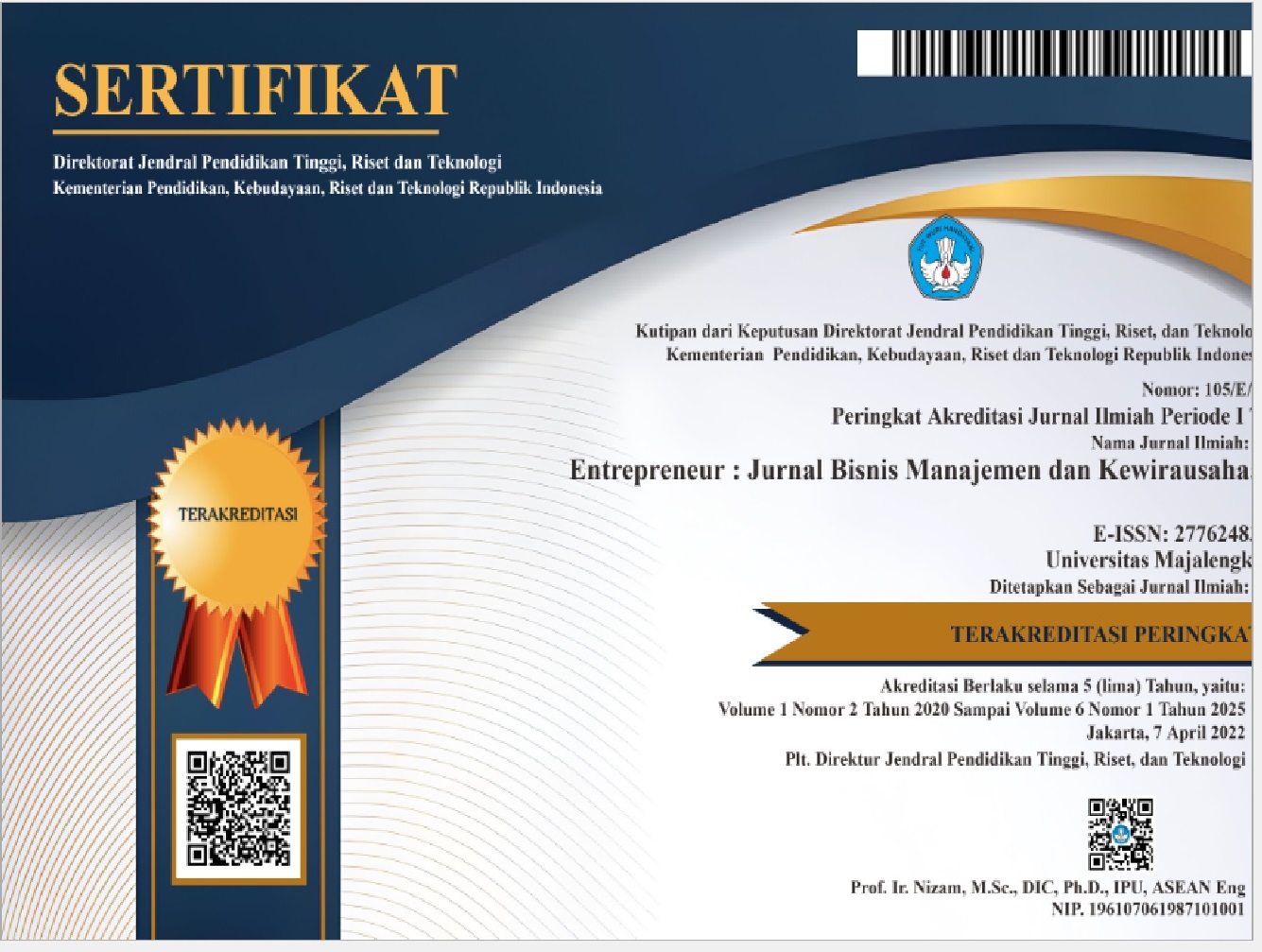PENGARUH BUDAYA ORGANISASI TERHADAP KUALITAS PELAYANAN PUBLIK DI KANTOR KEPALA DESA BANTARJATI KECAMATAN KERTAJATI KABUPATEN MAJALENGKA
DOI:
https://doi.org/10.31949/entrepreneur.v2i2.9894Abstract
This research is motivated by a problem related to the quality of public services caused by organizational culture. The formulation of the problem in this study is aimed at knowing how organizational culture, the quality of public services and how much influence organizational culture has on the quality of public services at the Bantarjati Village Head Office.
This research data consists of primary and secondary data obtained through direct research in the field. The population in this study consisted of 57 people and 50 people were taken as a sample, with a precision value of 95%. While the data analysis technique in this study, namely using quantitative methods with a descriptive-quantitative approach.
The results of this study indicate that the organizational culture and quality of public services are descriptively rated as good. While quantitatively the results of this study indicate that there is a strong positive effect of organizational culture on the quality of public services, which when percented the value is 57.5% and the remaining 42.5% is influenced by other factors outside the organizational culture variable.
In general, the conclusion of this study is that the application of a good organizational culture will empirically have a positive impact on the quality of public servants at the Bantarjati Village Office, Kertajati District, Majalengka Regency
Keywords:
Budaya Organisasi, Kualitas Pelayanan Publik.Downloads
References
A.S. Moenir. 2002. Manajemen Pelayanan Umum di Indonesia. Jakarta: PT. Bumi Aksara.
Amstrong Michael, 2010. Manajemen Sumber Daya Manusia. PT. Elexmedia Komputindo. Jakarta.
Diana Angelica, 2010. Perilaku Organisasi. Jakarta: Salemba Empat.
Edison, Anwar, Komariyah, 2016. Manajemen Sumber Daya Manusia, Bandung:
Alfabeta.
Handayaningrat Soewarno, 2002. Pengantar Studi Ilmu Administrasi dan Manajemen. Jakarta: Haji Masagung.
Hardiansyah, 2011. Kualitas Pelayanan Publik. Jakarta: PT. Rhineka Cipta.
Hasibuan Malayu, 2012. Manajemen Sumber Daya Manusia. Jakarta: PT Bumi. Aksara.
Keban T. Yeremias. 2004. Enam Dimensi Strategis Administrasi Publik, Konsep, Teori dan Isu. Gava Media. Yogyakarta.
Mangkunegara. 2011. Manajemen Sumber Daya Manusia Perusahaan. PT. Remaja. Rosdakarya. Bandung.
Nazir, Moh. 2005. Metode Penelitian. Jakarta: Ghalia Indonesia.
Pabundu Tika.2010. Budaya Organisasi dan Peningkatan Kinerja Perusahaan. Jakarta : PT. Bumi Aksara.
Pasolong Harbani, 2008. Teori Administrasi Publik. Bandung: CV Alfabeta.
Ratminto & Atik Septi Winarsih, Manajemen Pelayanan, Jakarta: Pustaka Pelajar, 2006.
Riduwan, 2011. Rumus dan Data dalam Aplikasi Statistika. Bandung: Alfabeta.
Rivai Veithzal, 2005. Manajemen Sumber Daya Manusia untuk Perusahaan. Jakarta: PT. Raja Grafindo Persada.
Siagian Sondang P, 2008. Filsafat Administrasi. Jakarta: PT Bumi Aksara.
Silalahi Ulber, 2011. Asas-Asas Manajemen. Bandung: Refika Aditama.
Sinambela, Lijan Poltak. Dkk. 2011. Reformasi Pelayanan Publik. Jakarta: BumiAksara.
Sugiyono. 2015. Metode Penelitian Kuantitatif Kualitatif R&B. Bandung: Aflabeta.
Tjiptono, Fandy, 2000, Manajemen Jasa, Edisi Ketiga, Andi Offset, Yogyakarta
Wibowo. 2013. Budaya Organisasi. PT Raja Grafindo Persada. Depok.
Published
How to Cite
Issue
Section
License
Copyright (c) 2024 Deni Herdiana, Detri Kurnia Nugraha

This work is licensed under a Creative Commons Attribution-ShareAlike 4.0 International License.
COPYRIGHT NOTICE
An author who publishes in the Entrepreneur: Jurnal Bisnis Manajemen dan Kewirausahaan agrees to the following terms:
1. Author retains the copyright and grants the journal the right of first publication of the work simultaneously licensed under the Creative Commons Attribution-ShareAlike 4.0 License that allows others to share the work with an acknowledgment of the work's authorship and initial publication in this journal
2. The author is able to enter into separate, additional contractual arrangements for the non-exclusive distribution of the journal's published version of the work (e.g., post it to an institutional repository or publish it in a book) with the acknowledgment of its initial publication in this journal.
3. The author is permitted and encouraged to post his/her work online (e.g., in institutional repositories or on their website) prior to and during the submission process, as it can lead to productive exchanges, as well as earlier and greater citation of the published work








